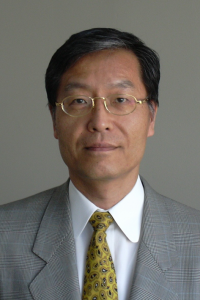A Big Problem After All: President Trump’s Trade Policies
US President Donald Trump’s comments regarding trade are drawing anxious concern from all directions. Certainly, upon checking President Trump’s various comments from an economics-based standpoint there are many mistakes to be found; and the possibility of those mistakes having a real and significant negative impact on global trade is now increasing.
The Two Types of Mistakes in Trump’s Views on Trade

Komine Takao, Professor, Department of Regional Development, Taisho University
As far as I can see, we can divide the mistakes in the newly inaugurated President Trump’s views on trade into two main types.
The first type of mistake is the clear and obvious type, which everyone can point out. A textbook example would be his assertions about protective trade. Trump insists that the influx of imported goods from overseas is robbing Americans of employment opportunities domestically. This naturally leads us to a policy of restricting imports in order to protect domestic employment; and when the countries on the other side of those restrictions begin to do the same, global trade will inevitably fall into a state of contracting equilibrium.
The fact that the new president is also critical of the promotion of multinational free trade is also great cause for concern. In the postwar global economy, multinational free trade has been promoted, primarily through the GATT (General Agreement on Tariffs and Trade) and WTO (World Trade Organization); while the signing of FTAs (free-trade agreements) has been promoted between multiple countries and regions as a next-best policy. The TPP (Trans-Pacific Partnership) agreement was one such agreement. When freedom of trade is encouraged in a limited group or region, trade generally is made inefficient. Inefficient trade does not occur in multinational trade frameworks, which is what makes them desirable.
In addition to this, while the United States has racked up significant trade deficits with countries like China and Japan, Trump claims that the reason why deficits arise is that China and Japan, etc., are imposing unfair import restrictions. Many people have criticized him for this; but the reason why — for example — the balance of automobile trade between the United States and Japan is tipped heavily in the direction of an export surplus of Japanese vehicles is quite simply that American consumers prefer Japanese cars, and the reason that American cars do not really sell well in Japan is that Japanese consumers do not choose to purchase them.
The second type of mistake that Trump makes is the type where, although he is mistaken from an economics standpoint, what he is saying is not perceived as a major problem because many people have the same kind of perceptions as he does.
For example, Trump appears to believe that exports constitute an economic plus and imports constitute an economic minus, and that having a trade surplus is preferential to a trade deficit. He often brings up the topic of America’s trade deficits with China and Japan, and seems to be thinking that these deficits are too large.
However, the real merits of trade only come when a country exports goods that it excels at producing and imports those that it does not. In other words, it is not desirable simply for exports to increase, but for both imports and exports to increase.
Moreover, it is not true that a trade balance in the black is a particularly desirable thing (the same thing also applies to current account balances). No link between a positive trade balance and an increase in public welfare has been found. Also, if we consider the fact that no other developed countries have made the balance of trade an economic policy objective, we can see that it is not an important policy issue. In fact, the balance of trade between two countries amounts to no more of a problem than that. Since the import and export structures of each country differ to begin with, it is only natural that the balance of trade between two countries will be uneven, so one could even go as far as to say that the very idea of making that balance the topic of discussions on policy is a mistake in itself.
However, it seems that many people — not only Americans, but Japanese too — have the vague belief that exports are desirable, and that it is better to have a positive balance of trade (a surplus) than a negative one (a deficit). In reality, therefore, there are very few people who will actually reject the idea of discussing the trade balance between two countries.
Concern Is Beginning To Shift Towards Reality
I had been paying careful attention as to whether these kind of concerns over Trump’s views on trade would end as needless fears, or whether they would develop into a real and actual threat. This is because I believed that, in any case, the people in America who actually implement political policy would rectify at least the first, obvious type of mistakes. However, it now seems that the views that Trump has expressed on trade are truly hard-core, and the possibility of them becoming a real obstacle to international trade has increased.
Firstly, with regard to the promotion of multinational free trade, directly after Trump’s inauguration he announced an overhaul of NAFTA (the North American Free Trade Agreement), and declared the United States’ withdrawal from TPP (the Trans-Pacific Partnership).
On March 1, the US government also issued a trade policy report to congress. The report indicated — among other things — that the United States would not necessarily comply with WTO dispute resolution procedures, would invest energies into bilateral negotiations, and would take steps such as imposing sanctions in some cases.
Following on from that, I was personally quite shocked by the joint declaration summarizing the results of the G20 international forum (with meetings held between the G20 member countries, regional finance ministers and central bank governors) that was held between March 17 and 18. Firstly, the pledge to “renounce protectionism” that had always been included in previous joint declarations had disappeared from this declaration. The new declaration also included the pledges to “reduce excessive global imbalances” and to “promote fairness.” It appears that these points were included at the insistence of the United States. At a press conference held after the G20 forum, US Secretary of the Treasury Steven Mnuchin is said to have stated that the US has had trade deficits for a long time, and it is important to rectify that.
Looking at these developments, I have a strong feeling that Trump’s remarks that countries like Japan and China are “creating trade deficits through unfair means” and that “it is important to reduce trade balance deficits” are finally starting to be raised as actual policy issues.
The determination of US government policy based on Trump’s mistaken views on trade will surely confuse world trade and become a destabilizing factor in the global economy. This is now shifting from an unfounded concern into an actual reality. Moreover, as indicated in the two types of mistakes mentioned earlier, at this present time, many people do not even share an understanding of the errors in his views on trade.
As far as the role of Japan is concerned, I hope that we will continue to persevere in making sound and correct assertions based on the logic of economics.
Translated from an original article in Japanese written for Discuss Japan. [March 2017]


